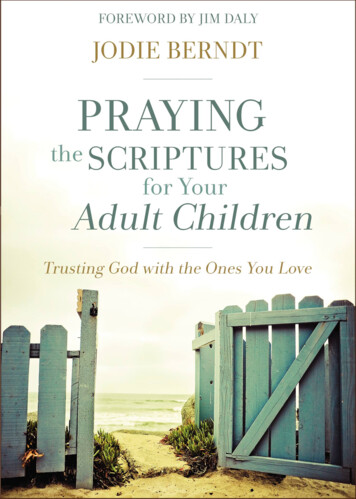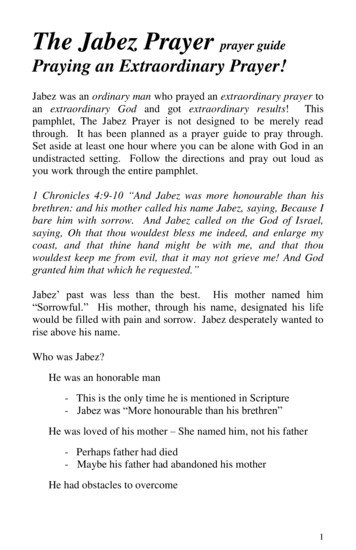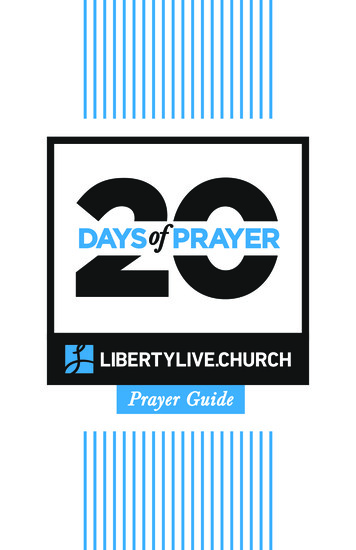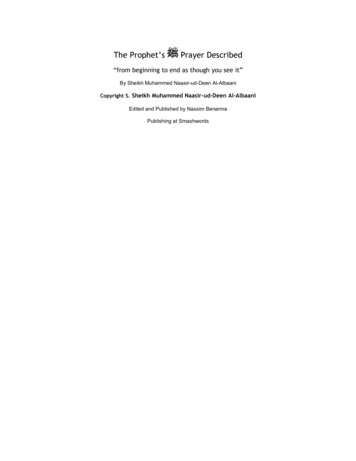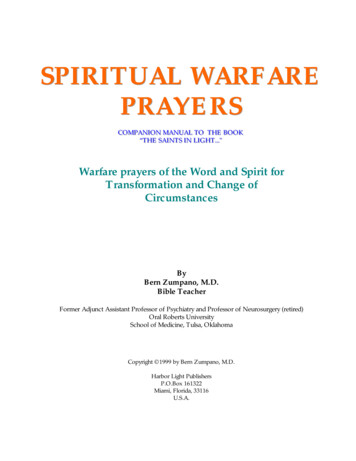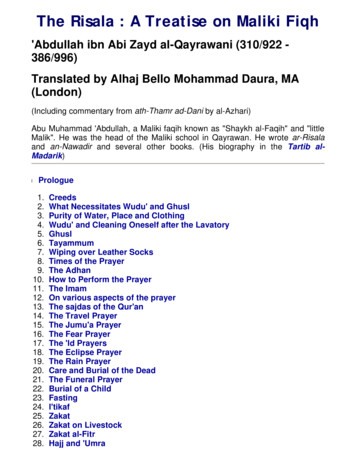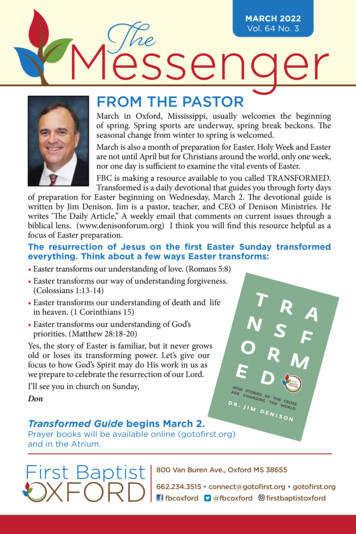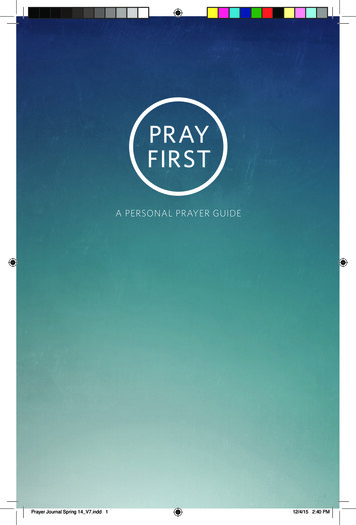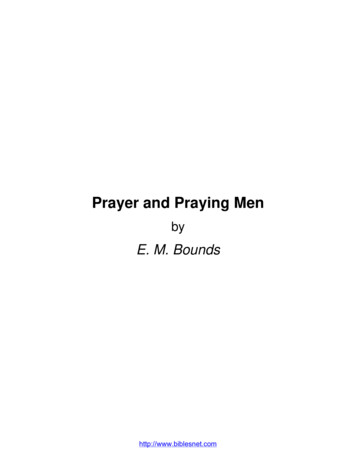
Transcription
Prayer and Praying MenbyE. M. Boundshttp://www.biblesnet.com
http://www.biblesnet.com
Prayer and Praying MenE. M. BoundsTable of ContentsAbout This Book. . . . . . . . . . . . . . . . . . . . . . . . . . . . . . . .INTRODUCTION. . . . . . . . . . . . . . . . . . . . . . . . . . . . . . . .I. PRAYING SAINTS OF THE OLD TESTAMENTS. . . . . . . . .II. PRAYING SAINTS OF THE OLD TESTAMENTS (Continued).III. ABRAHAM, THE MAN OF PRAYER. . . . . . . . . . . . . . . . .IV. MOSES, THE MIGHTY INTERCESSOR. . . . . . . . . . . . . .V. ELIJAH, THE PRAYING PROPHET. . . . . . . . . . . . . . . . .VI. HEZEKIAH, THE PRAYING KING. . . . . . . . . . . . . . . . . .VII. EZRA, THE PRAYING REFORMER. . . . . . . . . . . . . . . .VIII. NEHEMIAH, THE PRAYING BUILDER. . . . . . . . . . . . . .IX. SAMUEL, THE CHILD OF PRAYER. . . . . . . . . . . . . . . . .X. DANIEL, THE PRAYING CAPTIVE. . . . . . . . . . . . . . . . . .XI. FAITH OF SINNERS IN PRAYER. . . . . . . . . . . . . . . . . .XII. PAUL, THE TEACHER OF PRAYER. . . . . . . . . . . . . . . .XIII. PAUL AND HIS PRAYING. . . . . . . . . . . . . . . . . . . . . .XIV. PAUL AND HIS PRAYING (Continued). . . . . . . . . . . . . .XV. PAUL AND HIS REQUESTS FOR PRAYER. . . . . . . . . . .XVI. PAUL AND HIS REQUESTS FOR PRAYER (Continued). .Indexes. . . . . . . . . . . . . . . . . . . . . . . . . . . . . . . . . . . . . .Index of Scripture References. . . . . . . . . . . . . . . . . . . . . .iiihttp://www.biblesnet.com.p. iip. 1p. 3p. 6p. 9p. 11p. 15p. 20p. 25p. 27p. 30p. 33p. 36p. 40p. 45p. 49p. 53p. 56p. 60p. 60
Prayer and Praying MenE. M. Boundsivhttp://www.biblesnet.com
Prayer and Praying MenE. M. BoundsPRAYER AND PRAYING MENINTRODUCTIONRev. Edward McKendrie Bounds was passionately devoted to his beloved Lord and Saviour JesusChrist. His devotion was extraordinary in that he was praying and writing about Him all the time,except during the hours of sleeping.God gave Bounds an enlargedness of heart and an insatiable desire to do service for Him. Tothis end he enjoyed what I am pleased to term a transcendent inspiration, else he could never havebrought out of his treasury things new and old far exceeding anything we have known or read inthe last half century.Bounds is easily the Betelguese of the devotional sky. There is no man that has lived since thedays of the apostles that has surpassed him in the depths of his marvelous research into the Life ofPrayer.He was busily engaged in writing on his manuscripts when the Lord said unto him, “Well done,thou good and faithful servant, enter thou into the joys of thy Lord.” His letters would often cometo me in Brooklyn, N.Y., in 1911, 1912 and 1913,saying, “Pray for me that God will give me newnerves and new visions to finish the manuscripts.”Wesley was of the sweetest and most forgiving disposition, but when aroused he was a man ofthe “keenest penetration with a gift of speech that bit like the stroke of a whip.” Bounds was meekand humble, and never did we know him to retaliate upon any of his enemies. He cried over themand wept praying for them early and late.Wesley was easily gulled. “My brother,” said Charles, on one occasion in disgusting accents,“was, I believe, born for the benefit of knaves.” No man could impose on Bounds’ credulity. Hewas a diagnostician of rare ability. Bounds shied away from all frauds in profession, and wouldwaste no time upon them.Wesley was preaching and riding all day. Bounds was praying and writing day and night.Wesley would not allow any misrepresentation of his doctrinal positions in his late years. Boundsin this respect was very much like him.Wesley came to his fame while yet alive. He was always in the public eye. Bounds, while editinga Christian Advocate for twelve years, was little known out of his church.Wesley at eighty-six could still preach on the streets for thirty minutes. Bounds was able atseventy-five in the first hour of the fourth watch to pray for three hours upon his knees.Wesley, at the time of his death had enjoyed fifty-six years of preferment. His name was onevery tongue. Christianity was born again in England under his mighty preaching and organization.Bounds was comparatively unknown for fifty years but will recover the “lost and forgotten secretof the church” in the next fifty years.Wesley’s piety and genius and popularity flowed from his early life like a majestic river. Bounds’has been dammed up, but now it is beginning to sweep with resistless force and ere long he willbe the mighty Amazon of the devotional world.http://www.biblesnet.com
Prayer and Praying MenE. M. BoundsHenry Crabbe Robinson said in his diary when he heard Wesley preach at Colchester, “Hestood in a wide pulpit and on each side of him stood a minister, and the two held him up. His voicewas feeble and he could hardly be heard, but his reverend countenance, especially his long whitelocks, formed a picture never to be forgotten.” The writer of these lines gave up his pulpit inBrooklyn in 1912 to Rev. E. M. Bounds just ten months before his death. His voice was feeble andhis periods were not rounded out. His sermon was only twenty minutes long, when he quietly cameto the end and seemed exhausted.Wesley had sufficient money and to spare during all his career. Bounds did not care for money.He did not depreciate it; he considered it the lowest order of power.Wesley died with “an eye beaming and lips breaking into praise.” “The best of all is God withus,” Bounds wrote the writer of these lines. “When He is ready I am ready; I long to taste the joysof the heavenlies.”Wesley said, “The World is my parish.” Bounds prayed as if the universe was his zone.Wesley was the incarnation of unworldliness, the embodiment of magnanimity. Bounds wasthe incarnation of unearthliness, humility and self-denial. Wesley will live in the hearts of saintsfor everlasting ages. Bounds eternally.Wesley sleeps in City Road Chapel grounds, among his “bonny dead,” under marble, withfitting tribute chiseled in prose, awaiting the Resurrection. Bounds sleeps in Washington, Georgia,cemetery, without marble covering, awaiting the Bridegroom’s coming.These two men held ideals high and dear beyond the reach of other men. Has this race of menentirely gone out of the world now that they are dead? Let us pray.Homer W. HodgeBrooklyn N.Y.2http://www.biblesnet.com
Prayer and Praying MenE. M. BoundsI. PRAYING SAINTS OF THE OLD TESTAMENTSThe Holy Spirit will give to the praying saint the brightness of an immortal hope, themusic of a deathless song, in His baptism and communion with the heart, He will givesweeter and more enlarged visions of heaven until the taste for other things will pall, andother visions will grow dim and distant. He will put notes of other worlds in human heartsuntil all earth’s music is discord and songless.—Rev. E. M. BoundsOld Testament history is filled with accounts of praying saints. The leaders of Israel in those earlydays were noted for their praying habits. Prayer is the one thing which stands out prominently intheir lives.To begin with, note the incident in Joshua 10, where the very heavenly bodies were made subjectto prayer. A prolonged battle was on between the Israelites and their enemies, and when night wasrapidly coming on, and it was discovered that a few more hours of daylight were needful to ensurevictory for the Lord’s hosts, Joshua, that sturdy man of God, stepped into the breach, with prayer.The sun was too rapidly declining in the west for God’s people to reap the full fruits of a notedvictory, and Joshua, seeing how much depended upon the occasion, cried out in the sight and inthe hearing of Israel, “Sun, stand thou still upon Gideon, and thou moon in the Valley of Ajalon.”And the sun actually stood still and the moon stopped on her course at the command of this prayingman of God, till the Lord’s people had avenged themselves upon the Lord’s enemies.Jacob was not a strict pattern of righteousness, prior to his all-night praying. Yet he was a manof prayer and believed in the God of prayer. So we find him swift to call upon God in prayer whenhe was in trouble. He was fleeing from home fearing Esau, on his way to the home of Laban, akinsman. As night came on, he lighted on a certain place to refresh himself with sleep, and as heslept he had a wonderful dream in which he saw the angels of God ascending and descending ona ladder which stretched from earth to heaven. It was no wonder when he awoke he was constrainedto exclaim, “Surely the Lord is in this place and I knew it not.”Then it was he entered into a very definite covenant with Almighty God, and in prayer voweda vow unto the Lord, saying, “If God will be with me, and will keep me in this way that I go, andwill give me bread to eat and raiment to put on, so that I come again to my father’s house in peace;and shall the Lord be my God, and this stone which I have set for a pillar shall be God’s house;and of all that thou shalt give me, I will surely give one-tenth unto thee.”With a deep sense of his utter dependence upon God, and desiring above all the help of God,Jacob conditioned his prayer for protection, blessing and guidance by a solemn vow. Thus Jacobsupported his prayer to God by a vow.Twenty years had passed while Jacob tarried at the house of Laban, and he had married two ofhis daughters and God had given him children. He had increased largely in wealth, and he resolvedto leave that place and return home to where he had been reared. Nearing home it occurred to himthat he must meet his brother Esau, whose anger had not abated notwithstanding the passage ofmany years. God, however, had said to him, “Return to thy father’s house and to thy kindred, andI will be with thee.” In this dire emergency doubtless God’s promise and his vow made long agocame to his mind, and he took himself to an all-night season of prayer. Here comes to our noticethat strange, inexplicable incident of the angel struggling with Jacob all night long, till Jacob at last3http://www.biblesnet.com
Prayer and Praying MenE. M. Boundsobtained the victory. “I will not let thee go except thou bless me.” And then and there, in answerto his earnest, pressing and importunate praying, he was richly blessed personally and his namewas changed. But even more than that, God went ahead of Jacob’s desire, and strangely movedupon the angry nature of Esau, and lo and behold, when Jacob met him next day, Esau’s anger hadentirely abated, and he vied with Jacob in showing kindness to his brother who had wronged him.No explanation of this remarkable change in the heart of Esau is satisfactory which leaves outprayer.Samuel, the mighty intercessor in Israel and a man of God, was the product of his mother’sprayer. Hannah is a memorable example of the nature and benefits of importunate praying. No sonhad been born to her and she yearned for a man child. Her whole soul was in her desire. So shewent to the house of worship, where Eli, the priest of God, was, and staggering under the weightof which bore down on her heart she was beside herself and seemed to be really intoxicated. Herdesires were too intense for articulation. “She poured out her soul in prayer before the Lord.”Insuperable natural difficulties were in the way, but she “multiplied her praying,” as the passagemeans, till her God-lightened heart and her bright face recorded the answer to her prayers, andSamuel was hers by a conscious faith and a nation was restored by faith.Samuel was born in answer to the vowful prayer of Hannah, for the solemn covenant whichshe made with God if He would grant her request must not be left out of the account in investigatingthis incident of a praying woman and the answer she received. It is suggestive in James 5:15 that“The prayer of faith shall save the sick,” the word translated means a vow. So that prayer in itshighest form of faith is that prayer which carries the whole man as a sacrificial offering. Thusdevoting the whole man himself, and his all, to God in a definite, intelligent vow, never to bebroken, in a quenchless and impassioned desire for heaven—such an attitude of self-devotementto God mightily helps praying. Samson is somewhat of a paradox when we examine his religiouscharacter. But amid all his faults, which were grave in the extreme, he knew the God who hearsprayer and he knew how to talk to God.No farness to which Israel had gone, no depth to which Israel had fallen, no chains howeveriron with which Israel was bound but that their cry to God easily spanned the distance, fathomedthe depths, and broke the chains. It was the lesson they were ever learning and always forgetting,that prayer always brought God to their deliverance, and that there was nothing too hard for Godto do for His people. We find all of God’s saints in straits at different times in some way or another.Their straits are, however, often the heralds of their great triumphs. But for whatever cause theirstraits come, or of what kind soever, there is no strait of any degree of direness or from any sourcewhatsoever of any nature whatsoever, from which prayer could not extricate them. The great strengthof Samson does not relieve him nor extricate him out of his straits. Read what the Scriptures say:“And when he came unto Lehi, the Philistines shouted against him; and the Spiritof the Lord came mightily upon him, and the cords that were upon his arms became asflax that was burnt with fire, and his bands loosed from off his hands.“And he found a new jawbone of an ass, and put forth his hand, and took it, andslew a thousand men therewith.“And Samson said, With the jawbone of an ass, heaps upon heaps, with the jawboneof an ass have I slain a thousand men.4http://www.biblesnet.com
Prayer and Praying MenE. M. Bounds“And it came to pass when he had made an end of speaking, that he cast away thejawbone out of his hand, and called that place Ramath-Lehi.“And he was sore athirst, and called on the Lord, and said, Thou hast given thisgreat deliverance into the hand of thy servant, and now shall I die of thirst, and fall intothe hand of the uncircumcised?“But God clave a hollow place that was in the jaw, and there came water thereout;and when he had drunk, his spirit came again and he revived.”We have another incident in the case of this strange Old Testament character, showing how,when in great straits, their minds involuntarily turned to God in prayer. However irregular in lifethey were, however far from God they departed, however sinful they might be when trouble cameupon these men, they invariably called upon God for deliverance, and, as a rule, when they repentedGod heard their cries and granted their requests. This incident comes at the close of Samson’s life,and shows us how his life ended.Read the record as found in Judges 16. Samson had formed an alliance with Delilah, a heathenwoman, and she, in connivance with the Philistines, sought to discover the source of his immensestrength. Three successive times she failed, and at last by her persistence and womanly arts persuadedSamson to divulge to her the wonderful secret. So in an unsuspecting hour he disclosed to her thefact that the source of his strength was in his hair which had never been cut; and she deprived himof his great physical power by cutting off his hair. She called for the Philistines, and they came andput out his eyes and otherwise mistreated him.On an occasion when the Philistines were gathered together to offer a great sacrifice to Dagon,their idol god, they called for Samson to make sport for them. And the following is the account ashe stood there presumably the laughing-stock of these enemies of his and of God.“And Samson said unto the lad that held him by the hand, Suffer me that I may feelthe pillars whereupon the house standeth, that I may lean upon them.“Now the house was full of men and women; and all the lords of the Philistines werethere; and there were upon the roof about three thousand men and women, that beheldwhile Samson made sport.“And Samson called unto the Lord and said, O Lord God, remember me, I praythee, and strengthen me, I pray thee, only this once, my God, that I may be at onceavenged of the Philistines for my two eyes. And Samson took hold of the two middlepillars upon which the house stood, and on which it was borne up, of the one with hisright hand and of the other with his left.“And Samson said, Let me die with the Philistines. And he bowed himself with allhis might, and the house fell upon the lords, and upon all the people that were therewithin. So the dead which he slew at his death were more than they which he slew inhis life.”5http://www.biblesnet.com
Prayer and Praying MenE. M. BoundsII. PRAYING SAINTS OF THE OLD TESTAMENTS (Continued)Bishop Lambeth and Wainwright had a great M. E. Mission in Osaka, Japan. One daythe order came from high up that no more meetings would be allowed in the city byProtestants. Lambeth and Wainwright did all they could but the high officials were obstinateand unrelenting. They then retired to the room of prayer. Supper time came and the Japanesegirl came to summon them to their meal, but she fell under the power of prayer. Mrs. Lambethcame to find what the matter was and fell under the same power. They then rose and wentto the mission hall and opened it: and at once commenced meeting. God fell upon theassembly and two of the sons of the city officials came to the altar and were saved. Nextmorning one of the officials in authority came to the mission and said, “Go on with yourmeetings, you will not be interrupted.” The Osaka daily paper came out with box car letterssaying, “THE CHRISTIAN’S GOD CAME TO TOWN LAST NIGHT.”—Rev. H. C. Morrison.Jonah, the man who prayed in the fish’s belly, brings to view another remarkable instance of theseOld Testament worthies who were given to prayer. This man Jonah, a prophet of the Lord, was afugitive from God and from the place of duty. He had been sent on a mission of, warning to wickedNineveh, and had been commanded to cry out against them, “for their wickedness is come up beforeme,” said God. But Jonah, through fear or otherwise, declined to obey God, and took passage ona ship for Tarshish, fleeing from God. He seems to have overlooked the plain fact that the sameGod who had sent him on that alarming mission had His eye upon him as he hid himself on boardthat vessel. A storm arose as the vessel was on its way to Tarshish, and it was decided to throwJonah overboard in order to appease God and to avert the destruction of the boat and of all on board.But God was there as He had been with Jonah from the beginning. He had prepared a great fish toswallow Jonah, in order to arrest him, to defeat him in his flight from the post of duty, and to saveJonah that he might help to carry out the purposes of God.It was Jonah who was in the fish’s belly, in that great strait, and passing through a strangeexperience, who called upon God, who heard him and caused the fish to vomit him out on dry land.What possible force could rescue him from this fearful place? He seemed hopelessly lost, in “thebelly of hell,” as good as dead and damned. But he prays—what else can he do? And this is justwhat he had been accustomed to do when in trouble before.“I cried by reason of my affliction unto the Lord, and he heard me; out of the bellyof hell cried I, and thou heardst my voice.”And the Lord spake unto the fish, and it vomited out Jonah upon the dry land.Like others he joined prayer to a vow he had made, for he says in his prayer, “But I will sacrificeunto thee with the voice of thanksgiving; I will pay that that I have vowed. Salvation is of the Lord.”Prayer was the mighty force which brought Jonah from “the belly of hell.” Prayer, mightyprayer, has secured the end. Prayer brought God to the rescue of unfaithful Jonah, despite his sinof fleeing from duty, and God could not deny his prayer. Nothing is too hard for prayer becausenothing is too hard for God.6http://www.biblesnet.com
Prayer and Praying MenE. M. BoundsThat answered prayer of Jonah in the fish’s belly in its mighty results became an Old Testamenttype of the miraculous power displayed in the resurrection of Jesus Christ from the dead. Our Lordputs His seal of truth upon the fact of Jonah’s prayer and resurrection.Nothing can be simpler than these cases of God’s mighty deliverance. Nothing is plainer thanthat prayer has to do with God directly and simply. Nothing is clearer than that prayer has its onlyworth and significance in the great fact that God hears and answers prayer. This the Old Testamentsaints strongly believed. It is the one fact that stands out continuously and prominently in theirlives. They were essentially men of prayer.How greatly we need a school to teach the art of praying! This simplest of all arts and mightiestof all forces is ever in danger of being forgotten or depraved. The further we get away from ourmother’s knees, the further do we get away from the true art of praying. All our after-schoolingand our after-teachers unteach us the lessons of prayer. Men prayed well in Old Testament timesbecause they were simple men and lived in simple times. They were childlike, lived in childliketimes and had childlike faith.In citing the Old Testament saints noted for their praying habits, by no means must David beoverlooked, a man who preeminently was a man of prayer. With him prayer was a habit, for wehear him say, “Evening and morning and at noon will I pray and cry aloud.” Prayer with the SweetPsalmist of Israel was no strange occupation. He knew the way to God and was often found in thatway. It is no wonder we hear his call so dear and impressive, “O come, let us worship and bowdown; let us kneel before the Lord our Maker.” He knew God as the one being who could answerprayer: “O thou that hearest prayer, to thee shall all flesh come.”When God smote the child born of Bathsheba, because David had by his grievous sins givenoccasion of the enemies of God to blaspheme, it is no surprise that we find him engaged in a week’sprayer, asking God for the life of the child. The habit of his life asserted itself in this great emergencyin his home, and we find him fasting and praying for the child to recover. The fact that God deniedhis request does not at all affect the question of David’s habit of praying. Even though he did notreceive what he asked for, his faith in God was not in the least affected. The fact is that while Goddid not give him the life of that baby boy, He afterward gave him another son, even Solomon. Sothat possibly the latter son was a far great blessing to him than would have been the child for whomhe prayed.In close connection with this season of prayer, we must not overlook David’s penitential prayingwhen Nathan, by command of God, uncovered David’s two great sins of adultery and murder. Atonce David acknowledged his wickedness, saying unto Nathan, “I have sinned.” And as showinghis deep grief over his sin, his heart-broken spirit, and his genuine repentance, it is only necessaryto read Psalm 51 where confession of sin, deep humiliation and prayer are the chief ingredients ofthe Psalm.David knew where to find a sin-pardoning God, and was received back again and had the joysof salvation restored to him by earnest, sincere, penitential praying. Thus are all sinners broughtinto the divine favor, thus do they find pardon, and thus do they find a new heart.The entire Book of Psalms brings prayer to the front, and prayer fairly bristles before our eyesas we read this devotional book of the Scriptures.Nor must even Solomon be overlooked in the famous catalogue of men who prayed in OldTestament times. Whatever their faults, they did not forget the God who hears prayer nor did they7http://www.biblesnet.com
Prayer and Praying MenE. M. Boundscease to seek the God of prayer. While this wise man in his later life departed from God, and hissun set under a cloud, we find him praying at the commencement of his reign.Solomon went to Gibeon to offer sacrifice, which always meant that prayer went in closecompanionship with sacrifice, and while there, the Lord appeared to Solomon in a vision by night,saying unto him, “Ask what I shall give thee.” The sequel shows the material out of which Solomon’scharacter was formed. What was his request?“O Lord my God, thou hast made thy servant king instead of my father; and I ambut a little child; I know not how to go out or to come in.“And thy servant is in the midst of thy people which thou hast chosen, a great people,that cannot be numbered nor counted for multitude.“Give therefore thy servant an understanding heart to judge thy people, that I maydiscern between good and bad; for who is able to judge this thy so great a people?”We do not wonder that it is recorded as a result of such praying:“And the speech pleased the Lord, that Solomon had asked this thing.“And God said unto him, Because thou hast asked this thing, and hast not asked forthyself long life; neither hast asked riches for thyself, nor hast asked the life of thyenemies, but has asked for thyself understanding to discern judgment;“Behold I have done according to thy word; Lo, I have given thee a wise andunderstanding heart; so that there was none like thee before thee, neither after theeshall any arise like unto thee.“Also I have given thee that which thou hast not asked, both riches and honor; sothat there shall not be any among the kings like unto thee all thy days.”What praying was this! What self-deprecation and simplicity! “I am but a little child.” How hespecified the one thing needful! And see how much more he received than that for which he asked!Take the remarkable prayer at the dedication of the temple. Possibly this is the longest recordedprayer in God’s Word. How comprehensive, pointed, intensive, it is! Solomon could not afford tolay the foundations of God’s house in anything else but in prayer. And God heard this prayer as heheard him before, “And when Solomon had made an end of his praying, the fire came down fromheaven, and the glory of the Lord filled the house,” thus God attested the acceptance of this houseof worship and of Solomon, the praying king.The list of these Old Testament saints given to prayer grows as we proceed, and is too long tonotice at length all of them. But the name of Isaiah, the great evangelical prophet, and that ofJeremiah, the weeping prophet, must not be left out of the account. Still others might be mentioned.These are sufficient, and with their names we may close the list. Let careful readers of the OldScriptures keep the prayer question in mind, and they will see how great a place prayer occupiedin the minds and lives of the men of those early days.8http://www.biblesnet.com
Prayer and Praying MenE. M. BoundsIII. ABRAHAM, THE MAN OF PRAYEROh for determined men and women, who will rise early and really burn out for God.Oh for a faith that will sweep into heaven with the early dawning of the morning and haveships from a shoreless sea loaded in the soul’s harbor ere the ordinary laborer has knockedthe dew from his scythe or the huckster has turned from his pallet of straw to spread nature’streasures of fruit before the early buyers.—Rev. Homer W. Hodge.Abraham, the friend of God, was a striking illustration of one of the Old Testament saints whobelieved strongly in prayer. Abraham was not a shadowy figure by any means. In the simplicityand dimness of the patriarchal dispensation, as illustrated by him, we learn the worth of prayer, aswell as discover its antiquity. The fact is, prayer reaches back to the first ages of man on earth. Wesee how the energy of prayer is absolutely required in the simplest as well as in the most complexdispensations of God’s grace. When we study Abraham’s character, we find that after his call togo out into an unknown country, on his journey with his family and his household servants, whereverhe tarried by the way for the night or longer, he always erected an altar, and “called upon the nameof the Lord.” And this man of faith and prayer was one of the first to erect a family altar, aroundwhich to gather his household and offer the sacrifices of worship, of praise and of prayer. Thesealtars built by Abraham were, first of all, essentially altars about which he gathered his household,as distinguished from secret prayer.As God’s revelations became fuller and more perfect, Abraham’s prayerfulness increased, andit was at one of these spiritual eras that “Abraham fell on his face and God talked with him.” Onstill another occasion we find this man, “the father of the faithful,” on his face before God, astonishedalmost to incredulity at the purposes and revelations of Almighty God to him in promising him ason in his old age, and the wonderful engagements which God made concerning his promised son.Even Ishmael’s destiny is shaped by Abraham’s prayer when he prayed, “O that Ishmael mightlive before thee!”What a remarkable story is that of Abraham’s standing before God repeating his intercessionsfor the wicked city of Sodom, the home of his nephew Lot, doomed by God’s decision to destroyit! Sodom’s fate was for a while stayed by Abraham’s praying, and was almost entirely relievedby the humility and insistence of the praying of this man who believed strongly in prayer and whoknew how to pray. No other recourse was opened to Abraham to save Sodom but prayer. Perhapsthe failure to ultimately rescue Sodom from her doom of destruction was due to Abraham’s optimisticview of the spiritual condition of things in that city. It might have been possible,—who knows?—thatif Abraham had entreated God once more, and asked Him to spare the city if even one righteousman was found there, for Lot’s sake, He might have heeded Abraham’s request.Note another instance in the life of Abraham as showing how he was a man of prayer and hadpower with God. Abraham had
Jacob conditioned his prayer for protection, blessing and guidance by a solemn vow. Thus Jacob supported his prayer to God by a vow. Twenty years had passed while Jacob tarried at the house of Laban, and he had married two of his daughters and God had given him children. He had increased largely in wealth, and he resolved
